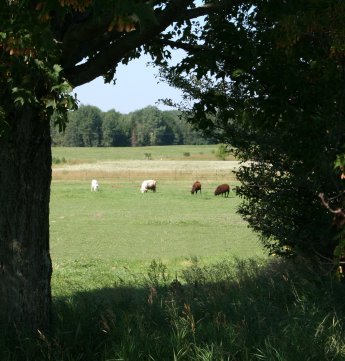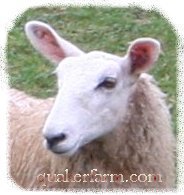Pasture Raised Lamb
Harrisville, Michigan
 The Lord is my shepherd; I shall not want.
He maketh me to lie down in green pastures:
The Lord is my shepherd; I shall not want.
He maketh me to lie down in green pastures:
he leadeth me beside the still waters.
He restoreth my soul....Psalm 23
Pasture Raised Lamb & Mutton
The Best Lamb for Cooking!
"Delicate, tender and mild" are the words most commonly used to describe Quaker Hill Farm's
all natural Border Leicester and Cotswold Lamb. Professional cooks love it,
and Cotswold lamb is featured on menues in the finest
up scale restaurants.
We raise Border Leicester sheep (they look like
the sheep in the movie "Babe") and Cotswold Sheep because they are especially well suited
to the pasture-based rotational system of sustainable farming employed by Quaker Hill Farm.
The delicious flavor of our Quaker Farm all-natural Border Leicester Lamb is a delight of subtle
variations based upon the seasonality of our rich forage; the healthy, non-chemical legumes,
grasses, and wild herbs in our pastures in Harrisville, Michigan.
Quaker Hill Farm lambs are raised on chemical free pastures, without antibiotics
or hormones. They graze on natural pastures, in the fresh air and sunshine.
Our lamb is natural in every since of the word - lambs are never fed animal-based commercial protein, just their
pure mother's milk and natural forage.
Ordering Information
We no longer sell processed lamb.
We sell spring born lambs between 4 - 11 months old weight ranging
between 40 - 95 pounds. PRICE: $150 live weight.
We can deliver to a processor of your choice (for a delivery fee) to be cut to your
specifications.
You make butchering arrangements with your processor
and pay them their
processing fee.
You may also
pick up your live lamb at the farm.
Order early, we sell out quickly. Please call for more information.
Border Leicester & Cotswold Sheep

Our flock consists of white and colored registered Border Leicester & registered Cotswold sheep.
All sheep have been selected for superior fleece (wool), mothering ability and structural correctness.
We do have spring pastured lambs available in the Spring of each year. Sheep on the homestead are an excellent
sustainable living projest.
About Cotswold Sheep
The Cotswold is a long wool sheep breed developed on the Cotswold Hills in the west of England. Sheep have been known in that
region since the time of the Roman conquest 2,000 years ago, and the Cotswold breed may descend in part from the white sheep
brought to England by the Romans.
The Cotswold breed was the foundation for the economic development of the Cotswold region, which is marked by “wool” churches
and estates. Wool profits also financed the exploration and trade expansion of the British Empire beginning in the
Elizabethan Era to such an extent that even today the British Chancellor of the Exchequer sits on a ceremonial Cotswold wool sack.
The modern form of the Cotswold breed was developed between 1780 and 1820, and importations to the United States began
about that time. The American Cotswold Record Association was established in 1878. The breed was particularly valued for
crossing onto fine wool ewes to produce large lambs that could be used for meat or kept for their heavy fleeces.
This success in crossbreeding, coupled with the lack of market demand for pure stock (thought to be too large and slow growing)
led to the near extinction of the Cotswold by the middle of the 1900s. In the last twenty years, however, the breed has experienced
a revival of interest, due primarily to the rediscovery of its wool by fiber crafters.
Cotswold fleece hangs in locks, and the fibers have a lustrous, silky sheen. A heavy forelock falling over the face is a
characteristic of the breed. The fleece has a ten to thirteen inch staple length.
Cotswolds are large framed sheep, and mature animals weigh 200–300 pounds. They are efficient grazers,
but require good forage for best performance. Cotswold sheep are known for their docile dispositions, and the
ewes are excellent mothers. The breeds name reflects the traditional habitat of the sheep: “cots” for the cotes or
small sheep folds where they were sheltered at night on the "wold," treeless hilly land.
Having the status of a rare breed, the Cotswold is one of the sheep breeds listed by the American Livestock Breeds Conservancy
as threatened endangered.
There are fewer than 1,000 annual registrations in North America,
with a global population estimated below 5,000.
Hand Spinning
Hand Spinners can select from our hand spinning fiber including raw fleeces, wool and wool roving. All fleeces are heavily skirted to
ensure that all the fiber you receive will be of prime hand spinning quality.
Doll Making (doll hair)
Doll making enthusiasts will love locks from our Border Leicester and Cotswold sheep. They are ideal for
doll hair, doll wigging, Santa beards and craft fiber. Cotswold sheep offer curly locks which are highly
desirable for use in doll making, Santa making, Santa beards, and other doll making projects.
Visit our Wool & Fiber page for more information.
Our new article about feeding orphaned lambs is now available online - visit here:
Feeding an Orphaned Lamb
|